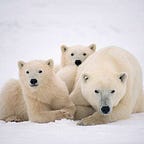“We do not inherit the Earth from our ancestors; we borrow it from our children.”
The common denominator shared by all animal communities is the fundamental dependency on the natural environment.
Resources must be available and habitat must be occupiable for survival to be possible in any biological context.
In human terms, a resilient ecosystem is essential to the functioning of all societies, irrespective of the individual or communal constructs of cultural identity, political stance and spiritual outlook. Future societal development, productive ethical discourse and a fruitful pursuit of human happiness cannot be conducted without hospitable environmental conditions. Differences in human values and aspirations become negligible in the face of the mounting climate crisis.
No game can be played in a burning arena.
Let’s summarise what we know about climate change, and what we anticipate will happen to the home to us all in its wake.
Firstly, a refresher on climate change itself.
The Earth’s climate has changed irrecognisably at various stages throughout its geological history; but anthropogenic climate change refers to the recent post-industrial shifts observed in meteorological processes that are attributable to human action. This encompasses phenomena including global average temperature rise, sea level rise, desertification and the augmentation of the severity and frequency of natural disasters. These climatic shifts will will be permanent or unbelievably costly to rectify.
Anthropogenic climate change is attributable to the greenhouse gas emissions that are released during an enormous variety of processes across every economic sector in every country. These gases reduce radiative forcing which means less infrared radiation leaves the Earth compared to historical levels due to increased atmospheric heat absorption.
The numbers speak for themselves.
Even the projections for an average global temperature increase of 2 degrees centigrade, a very possible outcome, spark fear. Besides the obvious (extreme drought, precipitation deficit, water unavailability, severe flooding, and a sea-ice-free Arctic), we are already observing or expect to observe:
- Extreme ocean acidification due to absorption of 30% of anthropogenic carbon emissions causing the mass extinction of 99% of the world’s coral;
- A reduction in total plant species count of 16%;
- New climate refugees to number in the hundreds of millions within decades (though estimates vary greatly. For context there are currently 68.5 million refugees, and there isn’t even a category for climate refugees yet); and
- The increased likelihood of armed conflict.
The stats are difficult to reconcile with our current experience, and any stomach-churning response brought on by reading them subsides (inconveniently) quickly. Having covered the literature in unparalleled depth, here’s a hypothetical exercise in empathy.
Have you ever felt disenchanted with the overall situation you’ve found yourself in on this planet? Unimpressed with the seemingly-immutable initial conditions like climate lethargy and partisan politics?
Now imagine that your predecessors had collectively done a better clean up job in anticipation of your arrival than they actually had. Perhaps intelligent intervention had occurred before we showed up to the party, allowing for a world where rivers were choked with less plastic and megacities in developing countries had more efficient transport and less life-threatening pollution than at present.
You can arbitrarily select any undesirable societal feature and visualise life if prior progress had already been made to rectify it. In our thought experiment, the latter certainly feels like a more desirable place. You’d have been thankful for the privileges bestowed upon you by your forerunners’ foresight, right?
Now think in the reverse direction. Consider the climate change-associated consequences listed beforehand. Imagine that right now, all those things were being realised to their full potential—dead oceans, ruinous food shortages, international conflict raging over agricultural land and as many as several per cent of the world’s population displaced as refugees because their islands have disappeared, their coastline has crumbled or local weather is too severe to allow continued settlement. Imagine yourself living this reality. This may soon be business as usual for an incomprehensible number of humans.
“We do not inherit the Earth from our ancestors; we borrow it from our children.”
Our overarching responsibility, the one we’ve heard stated and restated a thousand times, is to leave the Earth in a better condition than that in which we found it, not just for our reincarnated selves in future generations, but presently for the swathes of the human population in developing countries that will disproportionately bear the brunt of climatic impacts. Ought we not do everything we can to improve the initial conditions for the next (and current) iteration?
Yes.
So don’t let the worst of the predictions intimidate you into despondency. And certainly don’t let climate deniers come into positions of authority.
However, even political resistance to the deployment of clean energy is waning, while the free market makes up its own mind. Though different types of renewable energy sit at different points on the spectrum of technological maturity, the forerunners, wind and solar photovoltaics, have exhibited impressive cost curves thanks to research, innovation and iteration, meaning new energy procurement is dominated by renewables the world over. Recent modelling also suggests that in Australia, the reinvestment of less than 8% of aggregated superannuation holdings could drive complete decarbonisation of the electricity sector by 2030.
At present we still have the potential to circumvent the worst climate outcomes. To this end, the average reader of this article has the freedom to vote for constructive environmental policy, commit their earnings to ethical investments and consume thoughtfully from an endless range of products and services.
How can you help? Start incorporating the environment as a stakeholder in your personal, financial and professional decisions. Start thinking about where you’re excessively consuming and needlessly wasting.
Unfortunately, our children and nature cannot be consulted. But were that possible, we can approximate a pretty close guess as to what they’d want.
